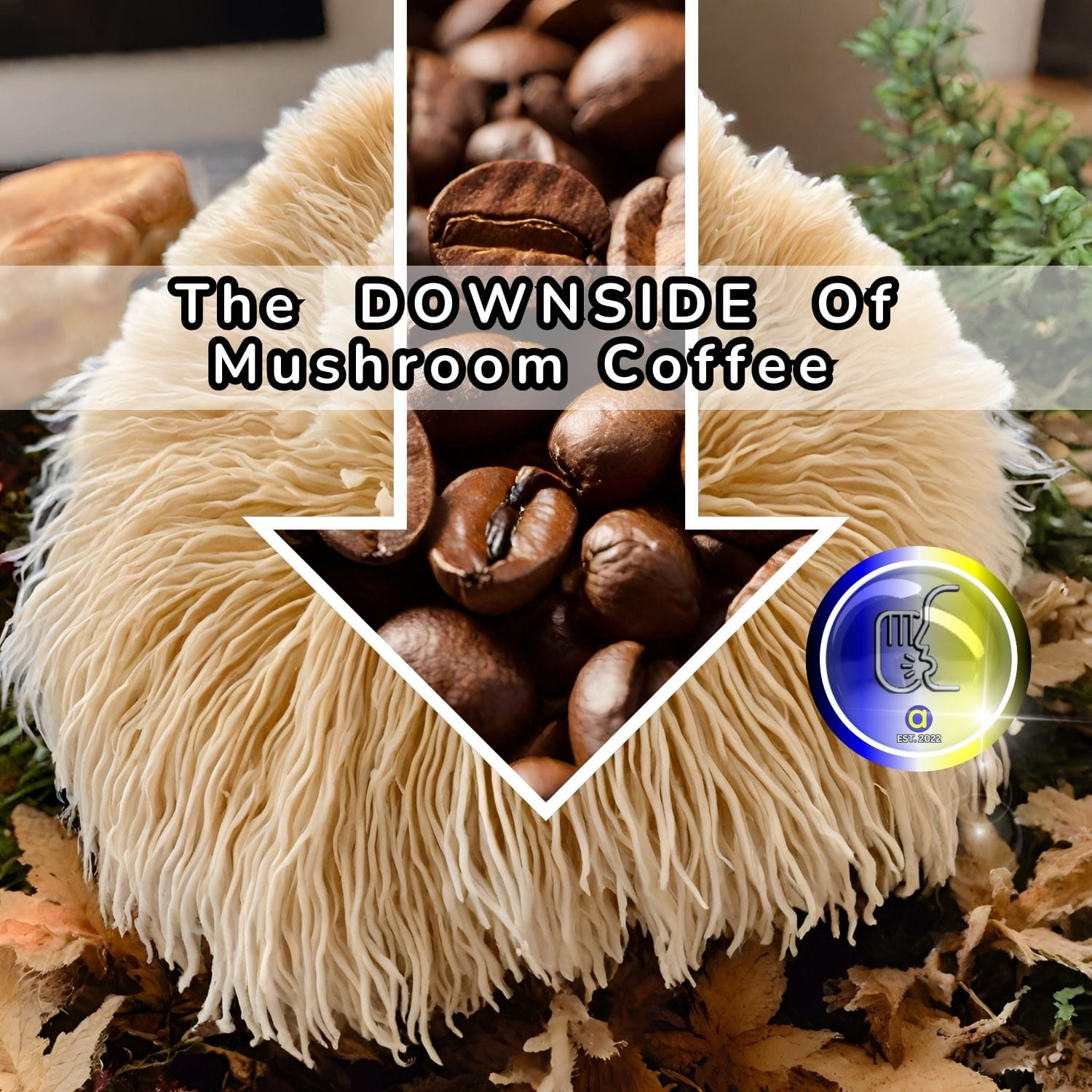Mushroom Coffee Has Been Stirring Up the Beverage Market
Its unique blend of ground coffee beans and powdered mushrooms. Touted for its potential health benefits, this trendy beverage has become a staple for many health-conscious individuals. But as with any product, especially those linked to health and wellness, it's crucial to understand both sides of the coin. In this article, we'll dive deep into the world of mushroom coffee and explore the potential downsides that consumers should be aware of.
The Caffeine Content Conundrum
For many, the morning cup of joe is a sacred ritual, a necessary kickstart to the day. Traditional coffee is known for its high caffeine content, which can lead to increased alertness and concentration. Mushroom coffee, on the other hand, typically contains less caffeine. This can be a downside for those who rely on their regular cup to get through the day. While some may appreciate the reduced risk of caffeine-related side effects, such as a rapid heart rate or stress, others might miss the full caffeine kick they've come to expect from their coffee.

Flavor Expectations vs. Reality
When it comes to taste, mushroom coffee's flavor profile can be quite different from that of traditional coffee. The earthy tones from the ground mushrooms can alter the taste significantly, which might not be to everyone's liking. While some mushroom coffee blends are designed to mimic the taste of regular coffee as closely as possible, the difference is still noticeable. This could be a deal-breaker for coffee aficionados who cherish the rich, robust flavor of a traditional brew.
The Health Claims Hurdle
Many mushroom coffee claim to offer a wide array of health benefits, from reduced inflammation to improved mental health. However, more human research is needed to substantiate these health claims fully. Much of the evidence supporting the benefits of mushroom coffee comes from studies conducted in test tubes or on animals, which may not translate directly to human health. Consumers should approach these claims with a healthy dose of skepticism and seek advice from a registered dietitian or healthcare provider.

Potential Interactions with Medications
One of the significant downsides of drinking mushroom coffee is the potential for interactions with certain medications. Medicinal mushrooms can affect the way the body metabolizes drugs, which could lead to either increased or decreased effectiveness of the medication. This is particularly important for those with chronic conditions or those taking medication for heart disease or digestive issues.
Medicinal mushrooms like lion's mane, chaga, and reishi have been used in traditional Chinese medicine for centuries. They are known for their anti-inflammatory properties and immune system support. However, the medicinal mushroom extracts in mushroom coffee may interact with certain medications or exacerbate underlying health issues. It's essential to understand that while these beneficial compounds can offer health advantages, they can also pose risks for some individuals.
The Environmental Impact of Mushroom Coffee Production
Mushroom coffee blend enthusiasts often tout the health benefits, but what about the environmental footprint? When considering the production of mushroom extract and mushroom powder, it's essential to look at the agricultural practices involved. Sustainable farming methods are crucial in maintaining the ecological balance. For instance, chaga mushrooms, which grow on birch trees, require careful harvesting to prevent damage to the host tree and ensure future growth. Overharvesting can lead to a decline in the chaga population, which disrupts local ecosystems.
Moreover, the process of converting these beneficial fungi into a form suitable for drinking coffee involves energy and resource consumption. The drying, grinding, and packaging of mushroom coffees need to be done responsibly to minimize carbon emissions and waste. Brands that prioritize eco-friendly practices, from sourcing to shipping, contribute to a healthier planet. As consumers, choosing products with a lower environmental impact can make a significant difference. It's not just about what's in your cup, but also about how it got there.
The Adaptogenic Attributes of Lion's Mane and Reishi
Mushroom coffee enthusiasts often rave about the inclusion of lion's mane and reishi mushrooms, not just for their unique taste but also for their adaptogenic properties. Adaptogens are substances that help the body resist stressors of all kinds, whether physical, chemical, or biological. Lion's mane, in particular, has been studied for its potential to support cognitive function and nerve growth. It's not just about the anti-inflammatory properties these mushrooms may possess; it's also about their ability to potentially stabilize our body's stress response, which could be a game-changer for those with high-pressure lifestyles.

Reishi mushrooms, on the other hand, have a history of use in traditional Eastern medicine, often linked to longevity and vitality. These mushrooms are believed to support the immune system and may even have a calming effect on the body, making them a popular choice for those looking to unwind with their cup of mushroom coffee. However, individuals with underlying heart issues should approach with caution, as adaptogens can have varying effects on blood pressure and heart rate. It's always recommended to consult with a healthcare provider before adding such potent ingredients to your diet.
Exploring Other Flavors in Mushroom Coffee Blends
When it comes to mushroom coffee, the conversation doesn't end with lion's mane and reishi. Other flavors are being explored to enhance the sensory experience of this unique beverage. For instance, chaga mushrooms are being incorporated for their earthy taste, while cordyceps are added for their more subtle, slightly sweet flavor profile. These additional flavors not only diversify the taste but may also contribute their own health benefits, such as increased energy levels and support for the immune system.
However, the integration of other flavors must be done thoughtfully to maintain the delicate balance between health benefits and palatability. Some consumers are initially taken aback by the robust, sometimes bitter flavors of mushroom coffee. Manufacturers are continually experimenting with different mushroom blends and roasting techniques to find the perfect harmony that will appeal to a broad audience. As the market for mushroom coffee grows, we can expect to see more innovative combinations that cater to both health-conscious individuals and those simply seeking a delicious alternative to traditional coffee.

The Historical Significance of Mushroom Coffee
Did you know that the concept of mushroom coffee isn't as modern as you might think? In fact, during World War II, when coffee was scarce, innovative individuals turned to local resources to find suitable substitutes. This is when the idea of using mushrooms for their coffee-like properties gained traction. In regions like Finland, locals began to harvest wild mushrooms, such as reishi and lion's mane, which were then dried and ground into a coffee-like substance. This practice provided a hot water-soluble solution that mimicked the traditional coffee experience.
Fast forward to today, and we see a resurgence of this tradition in the form of mushroom coffee blends. These contemporary versions often combine traditional coffee with mushroom extracts to offer a unique flavor profile and potential health benefits. The anti-inflammatory properties of mushrooms, along with their high levels of antioxidants, make them an attractive addition to the modern diet. However, it's important to remember that while mushroom coffees offer a nod to history, they also reflect our ongoing quest for alternative dietary choices that support both health and heritage.

The Decaffeinated Debate
For individuals looking to reduce their caffeine consumption, mushroom coffee may seem like an attractive alternative to decaffeinated coffee. However, it's important to note that while mushroom coffee contains less caffeine than a regular cup, it is not completely caffeine-free. Those sensitive to caffeine or looking to avoid it entirely may need to seek out other alternatives or consult with a healthcare provider before choosing to drink mushroom coffee. There are Decaffeinated Variations of Mushroom Coffee that we took an extensive look into and recommend some of the top rated brands. We even put together a F.A.Q and Buyers Guide.
The Unknowns of Commercially Farmed Mushrooms
The mushrooms used in mushroom coffee blends are often commercially farmed, which raises questions about their quality and the presence of beneficial compounds. Unlike wild-harvested mushrooms, commercially farmed varieties may have lower levels of the active ingredients that contribute to the health benefits of mushroom coffee. Consumers should research brands and their sourcing practices to ensure they're getting a product that lives up to its promises.
The Price Point Perspective
Mushroom coffee can be more expensive than traditional coffee, which might not be justifiable for everyone, especially if the health benefits are not conclusively proven. The cost of incorporating mushrooms into a daily routine could add up quickly, making it less accessible for those on a tight budget.
The Allergy and Intolerance Issue
As with any food product, there's always the risk of allergies or intolerances. Those who are allergic to mushrooms should obviously avoid mushroom coffee. Additionally, some individuals might experience digestive issues when consuming mushrooms, even in powdered form. It's crucial to be aware of your body's reactions and consult a healthcare provider if you're unsure about potential allergies or intolerances.
The Need for More Human Research
While the potential health benefits of mushroom coffee are intriguing, the emphasis is on the word "potential." There is a clear need for more human research to fully understand the effects of consuming mushrooms in coffee form. Until such research is conducted, the health claims associated with mushroom coffee should be viewed with caution.
Summary
Mushroom coffee has emerged as a trendy beverage with a host of claimed health benefits. However, it's not without its downsides. The reduced caffeine content, unique flavor profile, potential medication interactions, and unverified health claims are all factors to consider before making the switch from regular coffee. Additionally, the quality of commercially farmed mushrooms, the cost, and the risk of allergies or intolerances are important considerations. As with any dietary change, it's advisable to consult with a healthcare provider, especially for those with existing health conditions or concerns.

Q: What are the Top Recommended Mushroom Coffees
Some of the brands of Mushroom Coffee that have received great reviews are Four Sigmatic and La Republica. "allthepeoplesay.com" has compiled a list of 7 additional highly recommended Mushroom Coffee Brands that have received raving reviews.
Q: Can mushroom coffee completely replace my regular coffee?
A: Mushroom coffee can be an alternative to regular coffee, especially for those looking to reduce their caffeine intake. However, it may not provide the same caffeine boost or flavor that traditional coffee drinkers are accustomed to. It's also important to consider potential medication interactions and health claims that lack robust human research.
Q: Are there any negative side effects to drinking mushroom coffee?
A: Some individuals may experience negative side effects from drinking mushroom coffee, such as digestive issues or allergic reactions. Additionally, the medicinal mushrooms in the coffee could interact with certain medications. It's always best to start with a small amount and monitor your body's response.
Q: How do I know if mushroom coffee is right for me?
A: To determine if mushroom coffee is a good fit for you, consider your health goals, caffeine sensitivity, taste preferences, and budget. It's also crucial to research the brand and its sourcing practices. Consulting with a healthcare provider or a registered dietitian can provide personalized advice based on your individual health needs.







